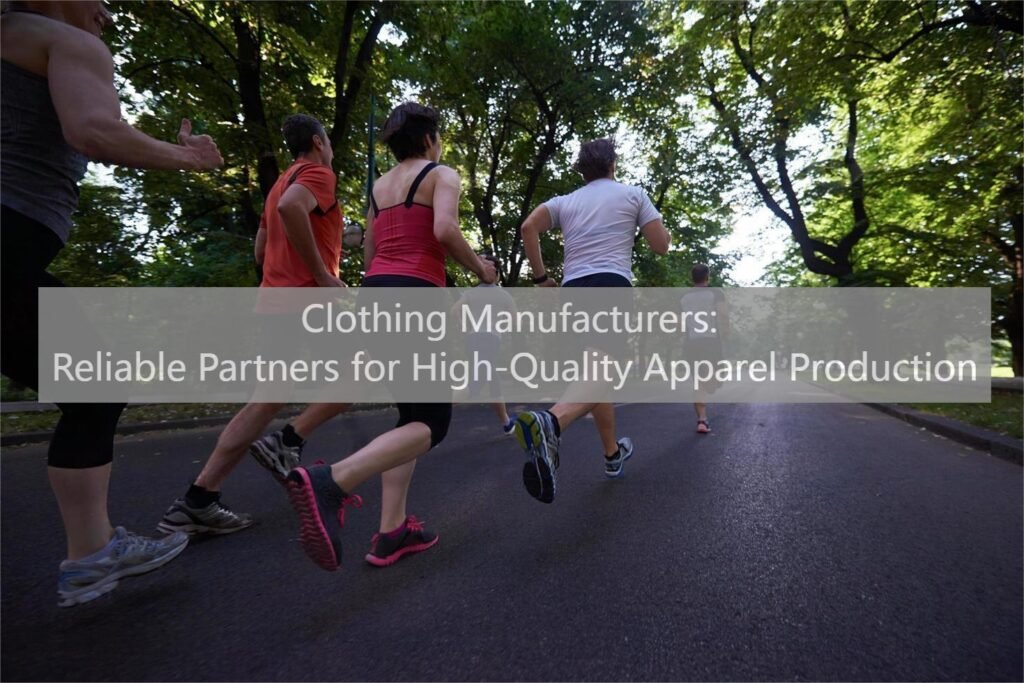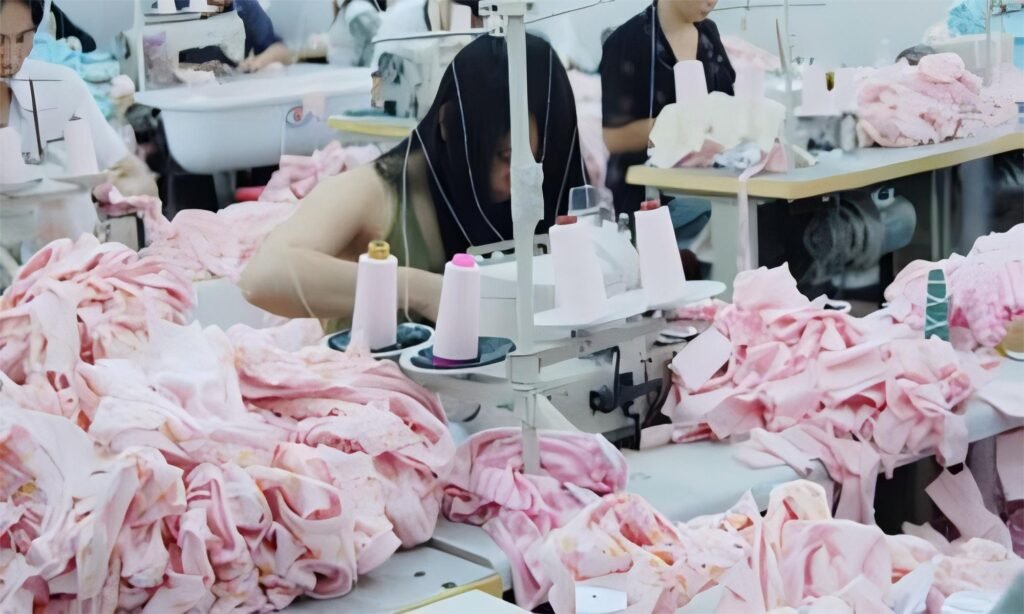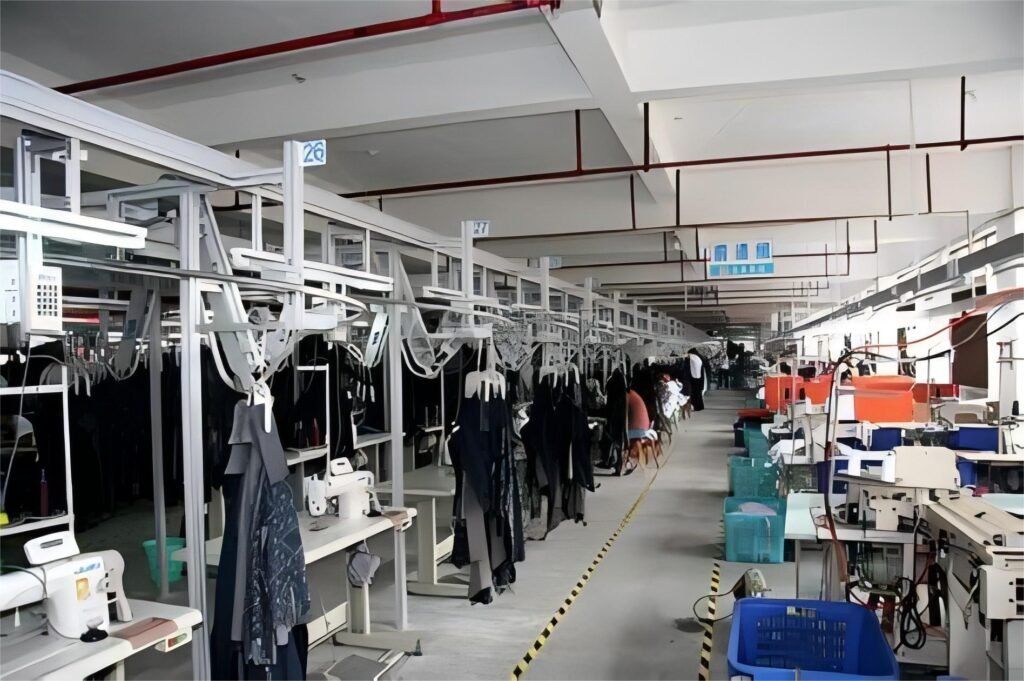No products in the cart.
Custom Yoga Pants
Clothing Manufacturers: Reliable Partners for High-Quality Apparel Production
Introduction: The Importance of Clothing Manufacturers in the Apparel Industry
The apparel industry is a multi-billion dollar global industry that relies heavily on clothing manufacturers for the production of high-quality garments. Clothing manufacturers play a crucial role in the supply chain, ensuring that apparel brands can bring their designs to life and meet the demands of consumers. Without reliable clothing manufacturers, the apparel industry would struggle to meet the ever-changing trends and demands of the market.

Understanding the Role of Clothing Manufacturers in the Supply Chain
Clothing manufacturers are an integral part of the supply chain in the apparel industry. They are responsible for transforming raw materials into finished garments that are ready for sale. This process involves various stages, including sourcing materials, pattern making, cutting, sewing, and quality control. Clothing manufacturers work closely with apparel brands to ensure that their designs are accurately translated into finished products.
Factors to Consider When Choosing a Clothing Manufacturer for High-Quality Apparel Production
When selecting a clothing manufacturer for high-quality apparel production, there are several factors that apparel brands should consider. Firstly, it is important to assess the manufacturer’s experience and expertise in producing the type of garments required. Different manufacturers specialize in different types of apparel, such as activewear, formalwear, or casual wear. It is crucial to choose a manufacturer that has a proven track record in producing the desired type of garments.
Another important factor to consider is the manufacturer’s production capacity. Apparel brands should ensure that the manufacturer has the capacity to meet their production needs, both in terms of quantity and timeline. This includes assessing the manufacturer’s production facilities, equipment, and workforce.
Additionally, it is essential to evaluate the manufacturer’s quality control processes. High-quality apparel production requires strict quality control measures to ensure that the finished products meet the brand’s standards. Apparel brands should inquire about the manufacturer’s quality control procedures, such as inspections, testing, and certifications.
The Benefits of Partnering with Reliable Clothing Manufacturers
Partnering with reliable clothing manufacturers offers numerous benefits for apparel brands. Firstly, it allows brands to focus on their core competencies, such as design, marketing, and sales, while leaving the production process to the experts. This enables brands to streamline their operations and allocate resources more efficiently.
Furthermore, partnering with reliable clothing manufacturers can help apparel brands reduce costs. Manufacturers often have established relationships with suppliers, allowing them to negotiate better prices for raw materials. Additionally, manufacturers can leverage economies of scale to reduce production costs, which can be passed on to the brand.
Another benefit of partnering with reliable clothing manufacturers is access to their expertise and industry knowledge. Manufacturers are often well-versed in the latest trends, technologies, and production techniques. They can provide valuable insights and recommendations to improve the design and production process, resulting in higher-quality garments.
How Clothing Manufacturers Ensure High-Quality Standards in Apparel Production
Ensuring high-quality standards in apparel production is a top priority for clothing manufacturers. To achieve this, manufacturers implement rigorous quality control measures throughout the production process. This includes inspecting raw materials for defects, conducting regular inspections during production, and performing final inspections before shipping the finished products.
Manufacturers also invest in state-of-the-art equipment and technology to enhance the quality of their production. This includes automated cutting machines, computerized sewing machines, and advanced quality control systems. By utilizing these technologies, manufacturers can improve accuracy, efficiency, and consistency in garment production.
Additionally, clothing manufacturers often collaborate with third-party testing laboratories to ensure that their garments meet industry standards and regulations. These laboratories conduct various tests, such as colorfastness, durability, and safety, to ensure that the garments are of high quality and safe for consumers.

The Process of Collaborating with Clothing Manufacturers for Custom Apparel Designs
Collaborating with clothing manufacturers for custom apparel designs involves a collaborative process between the brand and the manufacturer. It typically starts with the brand providing the manufacturer with design specifications, including sketches, measurements, and fabric choices. The manufacturer then creates a sample based on these specifications.
Once the sample is produced, the brand evaluates it for fit, quality, and design accuracy. Feedback is provided to the manufacturer, who then makes the necessary adjustments and creates a revised sample. This iterative process continues until the brand is satisfied with the final sample.
After the sample is approved, the manufacturer proceeds with bulk production. Throughout the production process, the brand maintains regular communication with the manufacturer to ensure that the garments meet their expectations. This includes reviewing production samples, conducting inspections, and addressing any issues that may arise.
The Role of Clothing Manufacturers in Sustainable and Ethical Apparel Production
In recent years, there has been a growing demand for sustainable and ethical apparel production. Clothing manufacturers play a crucial role in meeting this demand by implementing sustainable and ethical practices in their operations.
One aspect of sustainable apparel production is the use of eco-friendly materials. Manufacturers are increasingly sourcing materials that are organic, recycled, or biodegradable. This reduces the environmental impact of garment production by minimizing the use of harmful chemicals and reducing waste.
Ethical apparel production involves ensuring fair labor practices and safe working conditions for garment workers. Clothing manufacturers are responsible for ensuring that their workers are treated fairly, paid a living wage, and provided with safe working environments. This includes complying with labor laws and regulations, as well as implementing social compliance audits and certifications.
Case Studies: Successful Partnerships with Clothing Manufacturers for High-Quality Apparel
Several successful partnerships between apparel brands and clothing manufacturers have demonstrated the importance of reliable manufacturers in producing high-quality garments.
One such example is the partnership between Nike and its manufacturing partner, Flex. Flex is a global manufacturing company that specializes in producing athletic apparel. Through their partnership, Nike has been able to leverage Flex’s expertise and production capabilities to meet the demands of its customers. Flex’s advanced manufacturing technologies and quality control processes have helped Nike maintain its reputation for high-quality athletic apparel.
Another example is the partnership between luxury fashion brand Burberry and its manufacturing partner, Castleford. Castleford is a British clothing manufacturer that specializes in producing high-end garments. Burberry has relied on Castleford’s craftsmanship and attention to detail to produce its iconic trench coats and other luxury garments. Castleford’s commitment to quality and precision has helped Burberry maintain its reputation as a leading luxury brand.
The Future of Clothing Manufacturers: Trends and Innovations in Apparel Production
The future of clothing manufacturers is marked by several trends and innovations that are shaping the apparel industry. One such trend is the adoption of automation and robotics in garment production. Manufacturers are increasingly investing in automated cutting machines, sewing robots, and other technologies to improve efficiency and reduce costs. This allows manufacturers to produce garments at a faster pace while maintaining high quality.
Another trend is the integration of digital technologies in the design and production process. Manufacturers are utilizing computer-aided design (CAD) software, 3D modeling, and virtual prototyping to streamline the design process and reduce lead times. These technologies enable brands and manufacturers to collaborate more effectively, resulting in faster time-to-market and improved product quality.
Sustainability and ethical production practices are also expected to continue shaping the future of clothing manufacturers. Consumers are increasingly demanding transparency and accountability from apparel brands, which puts pressure on manufacturers to adopt sustainable and ethical practices. This includes using eco-friendly materials, reducing waste, and ensuring fair labor practices.
Tips for Finding and Evaluating Reliable Clothing Manufacturers for Your Apparel Brand
Finding and evaluating reliable clothing manufacturers for your apparel brand can be a daunting task. However, there are several tips that can help simplify the process and ensure that you choose the right partner.
Firstly, it is important to conduct thorough research and due diligence. This includes researching potential manufacturers, reading reviews and testimonials, and visiting their production facilities if possible. It is also advisable to request samples of their work to assess the quality of their garments.
Secondly, it is crucial to communicate your expectations and requirements clearly to the manufacturer. This includes providing detailed design specifications, production timelines, and quality standards. Clear communication from the outset helps to avoid misunderstandings and ensures that both parties are aligned.
Additionally, it is recommended to ask for references from other brands that have worked with the manufacturer. This allows you to gain insights into their experience and satisfaction with the manufacturer’s services. It is also beneficial to inquire about the manufacturer’s certifications and accreditations, as these can be indicators of their commitment to quality and ethical production practices.

Overcoming Challenges in Working with Clothing Manufacturers for High-Quality Apparel Production
Working with clothing manufacturers for high-quality apparel production can present several challenges that apparel brands need to overcome. One common challenge is maintaining consistent quality across multiple production runs. Manufacturers may face difficulties in replicating the same level of quality in each production batch, especially when dealing with complex designs or intricate details. Regular communication, inspections, and quality control measures can help address this challenge.
Another challenge is managing production timelines and meeting deadlines. Delays in production can have significant implications for apparel brands, including missed sales opportunities and dissatisfied customers. To overcome this challenge, it is important to establish clear timelines and milestones with the manufacturer, and to maintain regular communication to ensure that production stays on track.
Language and cultural barriers can also pose challenges in working with clothing manufacturers, especially when sourcing from overseas. Miscommunication and misunderstandings can occur, leading to errors in production. It is important to establish effective communication channels and to have a clear understanding of each other’s expectations and requirements.
Conclusion: Building Strong Partnerships with Clothing Manufacturers for Long-Term Success in the Apparel Industry
Clothing manufacturers are reliable partners for high-quality apparel production, playing a crucial role in the apparel industry’s supply chain. By understanding the importance of clothing manufacturers, brands can make informed decisions when selecting a manufacturer for their production needs.
Partnering with reliable clothing manufacturers offers numerous benefits, including cost savings, access to expertise, and streamlined operations. Manufacturers ensure high-quality standards in apparel production through rigorous quality control measures and the use of advanced technologies.
Collaborating with clothing manufacturers for custom apparel designs involves a collaborative process that requires clear communication and regular feedback. Manufacturers also play a vital role in sustainable and ethical apparel production by implementing eco-friendly practices and ensuring fair labor conditions.
Successful partnerships between apparel brands and clothing manufacturers, such as Nike and Flex, demonstrate the importance of reliable manufacturers in producing high-quality garments. The future of clothing manufacturers is marked by trends and innovations, including automation, digital technologies, and sustainable practices.
Finding and evaluating reliable clothing manufacturers requires thorough research, clear communication, and references from other brands. Overcoming challenges in working with manufacturers, such as maintaining consistent quality and meeting production timelines, requires effective communication and regular inspections.
Building strong partnerships with clothing manufacturers is essential for long-term success in the apparel industry. By selecting the right manufacturer and maintaining open communication, apparel brands can ensure the production of high-quality garments that meet the demands of consumers.
